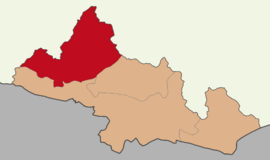Tahtalıkaradut is a village in the Musabeyli District, Kilis Province, Turkey. The village had a population of 1272 in 2022.
Çınarköy is a village in the Musabeyli District, Kilis Province, Turkey. The village had a population of 252 in 2022.
Körahmethüyüğü is a village in the Musabeyli District, Kilis Province, Turkey. The village had a population of 227 in 2022.
Gündeğer, historically Kaman, is a village in the Musabeyli District, Kilis Province, Turkey. The village had a population of 185 in 2022.
Ağcakent is a village in the Musabeyli District, Kilis Province, Turkey. The village had a population of 125 in 2022.
Kızılkent is a village in the Musabeyli District, Kilis Province, Turkey. The village had a population of 296 in 2022.
Kolpınar, historically Vırıklar, is a village in the Musabeyli District, Kilis Province, Turkey. The village had a population of 78 in 2022.
Yukarıbademli, historically Eşşekkuyu Fevkani, is a village in the Musabeyli District, Kilis Province, Turkey. The village had a population of 88 in 2022.
Yukarıkalecik is a village in the Musabeyli District, Kilis Province, Turkey. The village had a population of 79 in 2022.
Hüseyinoğlu is a village in the Musabeyli District, Kilis Province, Turkey. The village had a population of 343 in 2022.
Kaynaklı, historically Güççük Kardem, is a village in the Musabeyli District, Kilis Province, Turkey. The village had a population of 37 in 2022.
Dutluca, historically Ferise, is a village in the Musabeyli District, Kilis Province, Turkey. The village had a population of 83 in 2022.
Koçcağız, historically Kozcuğaz, is a village in the Musabeyli District, Kilis Province, Turkey. The village had a population of 108 in 2022.
Zeytinbağı, historically Haskanlı, is a village in the Musabeyli District, Kilis Province, Turkey. The village had a population of 120 in 2022.
Kurtaran, historically Siptiruz, is a village in the Musabeyli District, Kilis Province, Turkey. The village had a population of 244 in 2022.
Tokaçgemriği is a village in the Musabeyli District, Kilis Province, Turkey. The village had a population of 138 in 2022.
Fericek is a village in the Musabeyli District, Kilis Province, Turkey. The village had a population of 166 in 2022.
Gözlüce, historically Kastel, is a village in the Musabeyli District, Kilis Province, Turkey. The village had a population of 101 in 2022.
Üçpınar is a village in the Musabeyli District, Kilis Province, Turkey. The village had a population of 158 in 2022.
Balıklı is a village in the Musabeyli District, Kilis Province, Turkey. The village had a population of 62 in 2022.



